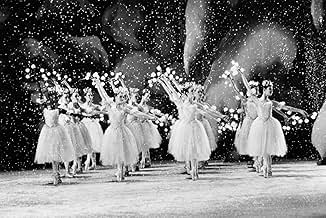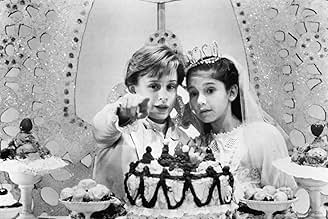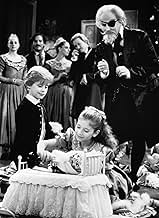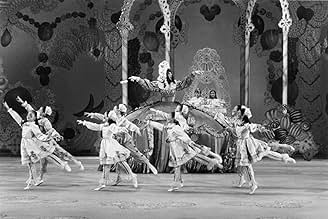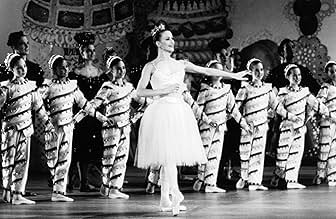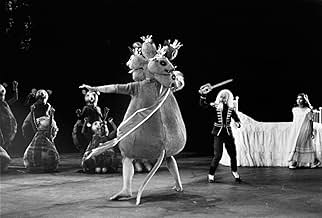On Christmas Eve, a little girl named Marie falls asleep after a party at her house and dreams of a fantastic world where toys become larger than life.On Christmas Eve, a little girl named Marie falls asleep after a party at her house and dreams of a fantastic world where toys become larger than life.On Christmas Eve, a little girl named Marie falls asleep after a party at her house and dreams of a fantastic world where toys become larger than life.
- Director
- Writer
- All cast & crew
- Production, box office & more at IMDbPro
Storyline
Did you know
- TriviaNarration recorded by Kevin Kline was a last-minute addition that was heavily protested by Macaulay Culkin's father, Kit Culkin, who vowed that his son would do no publicity for the movie until the narration was dropped. Reluctantly, producer Arnon Milchan dropped the narration to appease the Culkins. Kit Culkin then returned with a list of other demands which so incensed Milchan that he reinstated Kline's narration, losing the use of the Culkins' publicity.
- Crazy creditsIn the opening credits, Macaulay Culkin is listed as playing Drosselmeier's nephew, but he is not listed as playing either The Nutcracker or The Prince.
- SoundtracksThe Nutcracker: Overture
(uncredited)
Music by Pyotr Ilyich Tchaikovsky
The New York City Ballet Orchestra (with chorus) conducted by David Zinman
Featured review
I'd seen parts of this production before but I wanted to refresh my initial reactions and see if they were correct. I think they were!
I've always thought Balanchine was very old-fashioned in his attitudes, particularly in the ballerina-and-her-cavalier prototype. But this is, of course, what Russian ballet is all about.
I was mostly interested in seeing if Balanchine would keep the music up to speed and I find he has. After seeing the traditional performances where everything is slowed down to a glacial pace to accommodate the dancers, this is most refreshing and as a record of Mr. B's approach, this video production is invaluable.
Others have mentioned the music-tampering but this is not unusual in the dance world or even in Balanchine. One glaring example of this is his "Serenade" where Tchaikovsky's last two movements are reversed; the "Elegy" is the last thing heard instead of the fast finale. In all fairness, Balanchine assumed that his own works would be forgotten with time and would not become the monuments they have.
Is the 12 year old Culkin as bad as all that? In context, his star power has proved a liability here and this is at least partly due to his overall awkwardness in the nephew-prince role. Smiling or smirking professionally in that dreadful pink Lord Fauntleroy suit he can often look downright sinister. (He later used that quality in "Party Monster" for example.) And, with almost nothing to do except lend his presence to the second part, whenever they show him in passing I find the effect jarring.
Mack aside, the photography is good in general though awkward in the pan-and-scan version close-ups. The narration really shouldn't have happened but it's not too disturbing.
the DVD: It's a two-sided DVD with no real labels. (Watch your fingers!) The second side is the letterboxed one which I think is more successful than the pan-and-scan first side. The extras are informative but sparse.
6 or 7 out of 10.
I've always thought Balanchine was very old-fashioned in his attitudes, particularly in the ballerina-and-her-cavalier prototype. But this is, of course, what Russian ballet is all about.
I was mostly interested in seeing if Balanchine would keep the music up to speed and I find he has. After seeing the traditional performances where everything is slowed down to a glacial pace to accommodate the dancers, this is most refreshing and as a record of Mr. B's approach, this video production is invaluable.
Others have mentioned the music-tampering but this is not unusual in the dance world or even in Balanchine. One glaring example of this is his "Serenade" where Tchaikovsky's last two movements are reversed; the "Elegy" is the last thing heard instead of the fast finale. In all fairness, Balanchine assumed that his own works would be forgotten with time and would not become the monuments they have.
Is the 12 year old Culkin as bad as all that? In context, his star power has proved a liability here and this is at least partly due to his overall awkwardness in the nephew-prince role. Smiling or smirking professionally in that dreadful pink Lord Fauntleroy suit he can often look downright sinister. (He later used that quality in "Party Monster" for example.) And, with almost nothing to do except lend his presence to the second part, whenever they show him in passing I find the effect jarring.
Mack aside, the photography is good in general though awkward in the pan-and-scan version close-ups. The narration really shouldn't have happened but it's not too disturbing.
the DVD: It's a two-sided DVD with no real labels. (Watch your fingers!) The second side is the letterboxed one which I think is more successful than the pan-and-scan first side. The extras are informative but sparse.
6 or 7 out of 10.
- standardmetal
- Dec 8, 2004
- Permalink
- How long is The Nutcracker?Powered by Alexa
Details
- Release date
- Country of origin
- Official site
- Language
- Also known as
- George Balanchine's The Nutcracker
- Filming locations
- New York City, New York, USA(Studio)
- Production companies
- See more company credits at IMDbPro
Box office
- Budget
- $19,000,000 (estimated)
- Gross US & Canada
- $2,119,994
- Opening weekend US & Canada
- $783,721
- Nov 28, 1993
- Gross worldwide
- $2,119,994
- Runtime1 hour 32 minutes
- Sound mix
- Aspect ratio
- 1.85 : 1
Contribute to this page
Suggest an edit or add missing content




